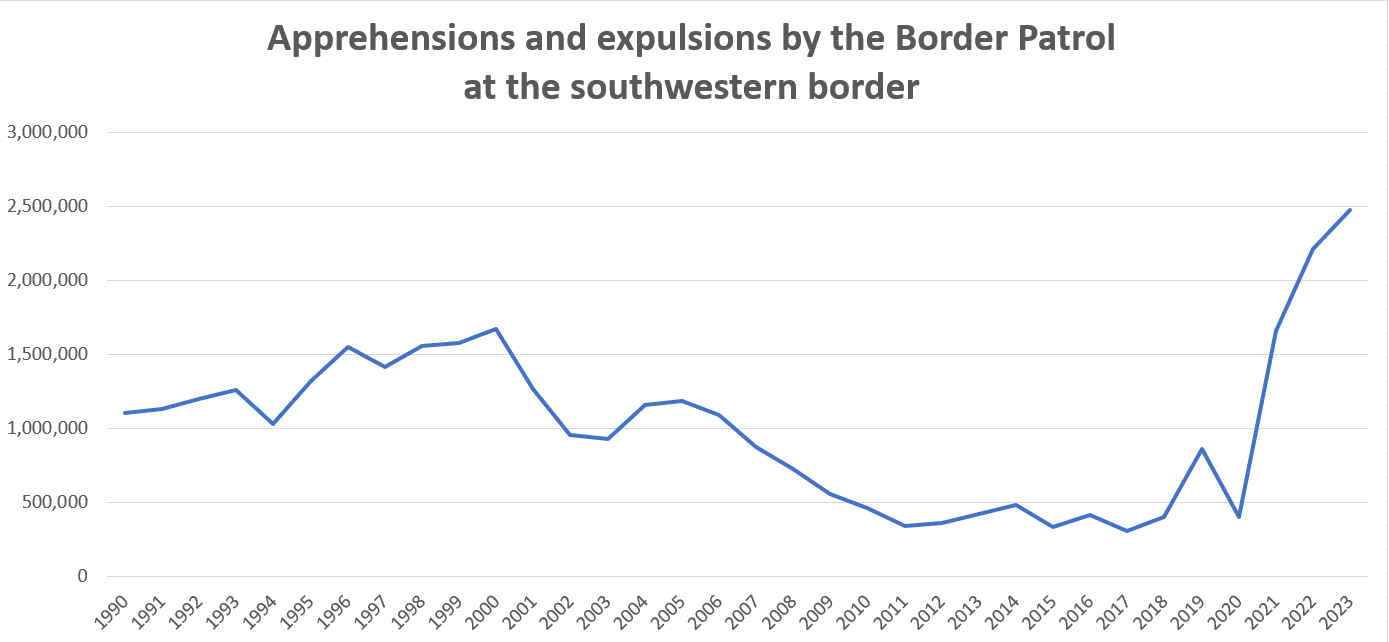Tangle - My solutions to the border crisis
|
Older messages
The deaths of U.S. troops in Jordan.
Thursday, February 1, 2024
Plus, what happens to campaign money after a candidate drops out? The deaths of US troops in Jordan. By Isaac Saul • 1 Feb 2024 • Comment View in browser View in browser President Biden (left) laying a
Good news on the economy?
Wednesday, January 31, 2024
Plus, is this the year a 3rd party candidate makes a difference? Good news on the economy? By Isaac Saul • 31 Jan 2024 • Comment View in browser View in browser Photo by Mathieu Stern / Unsplash I'
The border standoff in Texas.
Wednesday, January 31, 2024
Tensions are rising as the crisis continues. The border standoff in Texas. By Isaac Saul • 30 Jan 2024 • Comment View in browser View in browser Migrants trying to cross along razor wire to cross Texas
The ICJ's ruling on genocide in Gaza.
Monday, January 29, 2024
Plus, a reader asks about Tangle's finances and what we do with our money. The ICJ's ruling on genocide in Gaza. By Isaac Saul • 29 Jan 2024 • Comment View in browser View in browser A
The Sunday — January 28
Sunday, January 28, 2024
This is the Tangle Sunday Edition, a brief roundup of our independent politics coverage plus some extra features for your Sunday morning reading. What the left is doodling. Andy Marlette | Creators
You Might Also Like
Google plans departure from Seattle’s Fremont neighborhood | Microsoft's quest for a quantum leap
Saturday, March 1, 2025
Seattle-area sisters lead stealthy social commerce startup ADVERTISEMENT GeekWire SPONSOR MESSAGE: SEA Airport Is Moving from Now to WOW!: Take a virtual tour of what's coming. TODAY'S TOP
Crypto Rout Wipes Trump Gains | SEC’s Crusade On Crypto Ends
Saturday, March 1, 2025
Bitcoin retreated more than 25% from its all-time high on Friday. Forbes START INVESTING • Newsletters • MyForbes Nina Bambysheva Staff Writer, Forbes Money & Markets Follow me on X and Forbes.com
Survive Trump's speech with friends (and facts).
Saturday, March 1, 2025
Live chat his Joint Address to Congress w/ us 👉 ͏ ͏ ͏ ͏ ͏ ͏ ͏ ͏ ͏ ͏ ͏ ͏ ͏ ͏ ͏ ͏ ͏ ͏ ͏ ͏ ͏ ͏ ͏ ͏ ͏ ͏ ͏ ͏ ͏ ͏ ͏ ͏ ͏ ͏ ͏ ͏ ͏ ͏ ͏ ͏ ͏ ͏ ͏ ͏ ͏ ͏ ͏ ͏ ͏ ͏ ͏ ͏ ͏ ͏ ͏ ͏ ͏ ͏ ͏ ͏ ͏ ͏ ͏ ͏ ͏ ͏ ͏ ͏ ͏ ͏ ͏ ͏ ͏ ͏ ͏ ͏ ͏
Guest Newsletter: Five Books
Saturday, March 1, 2025
Five Books features in-depth author interviews recommending five books on a theme Guest Newsletter: Five Books By Sylvia Bishop • 1 Mar 2025 View in browser View in browser Five Books features in-depth
Brutalist architecture in the spotlight
Saturday, March 1, 2025
+ Greenland's hazardous landscape
What the Strategist Editors Bought in February
Saturday, March 1, 2025
Plus: What Rebecca Black can't live without. The Strategist Every product is independently selected by editors. If you buy something through our links, New York may earn an affiliate commission.
YOU LOVE TO SEE IT: Microplastics Meet Their Match
Saturday, March 1, 2025
Your fruit bowl comes to the rescue, traffic tax hits the jackpot, anti-abortion activists get buffered, and the Granite State goes green. YOU LOVE TO SEE IT: Microplastics Meet Their Match By Sam
Revenge Tour
Saturday, March 1, 2025
March 01, 2025 The Weekend Reader Required Reading for Political Compulsives 1. Musk, DOGE, and the AI-Fueled Plot to Fire Everybody MAGA takes a cue from big tech and embraces post-human politics.
Weekend Briefing No. 577
Saturday, March 1, 2025
The State of Startup Funding -- Creative Flow Mystery -- I Once Was Blind ͏ ͏ ͏ ͏ ͏ ͏ ͏ ͏ ͏ ͏ ͏ ͏ ͏ ͏ ͏ ͏ ͏ ͏ ͏ ͏ ͏ ͏ ͏ ͏ ͏ ͏ ͏ ͏ ͏ ͏ ͏ ͏ ͏ ͏ ͏ ͏ ͏ ͏ ͏ ͏ ͏ ͏ ͏ ͏ ͏ ͏ ͏ ͏ ͏ ͏ ͏ ͏ ͏ ͏ ͏ ͏ ͏ ͏ ͏ ͏ ͏ ͏ ͏ ͏
Your new crossword for Saturday Mar 01 ✏️
Saturday, March 1, 2025
View this email in your browser Challenge yourself — and your friends — with our latest crossword. We have six new puzzles teed up for you this week! You can find all of our new crosswords in one place


